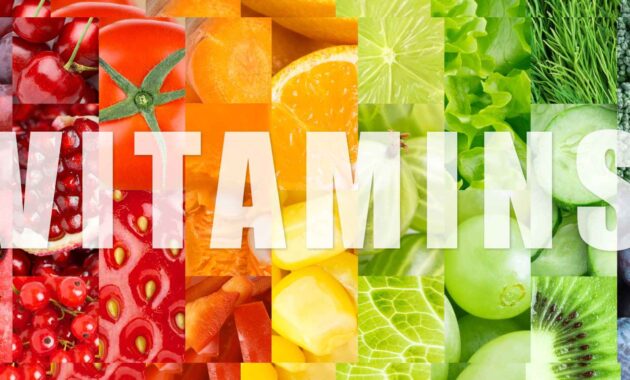Vitamins are organic compounds that our bodies require in small quantities to function optimally. They are essential for a wide range of bodily processes, including metabolism, immune function, and maintaining healthy skin, hair and bones. Unlike macronutrients (carbohydrates, proteins, and fats), which provide energy, vitamins are classified as micronutrients because they are needed in much smaller amounts.
Types of vitamins
Vitamins are typically categorised into two groups: water-soluble and fat-soluble.
Water-Soluble vitamins
1. Vitamin C: Known for its immune-boosting properties, vitamin C is found in citrus fruits, strawberries, and broccoli.
2. B-Vitamins: This group includes B1 (thiamine), B2 (riboflavin), B3 (niacin), B5 (pantothenic acid), B6 (pyridoxine), B7 (biotin), B9 (folate), and B12 (cobalamin) vitamins. These vitamins play various roles, including energy production and DNA synthesis. Sources include whole grains, leafy greens, dairy, and lean meats.

Fat-Soluble Vitamins
1. Vitamin A: Essential for vision and skin health, vitamin A can be found in foods like sweet potatoes, carrots, and spinach.
2. Vitamin D: Often referred to as the sunshine vitamin, vitamin D can be synthesized by the skin when exposed to sunlight. It’s also found in fatty fish and fortified dairy products.
3. Vitamin E: An antioxidant that helps protect cells from damage, vitamin E is abundant in nuts, seeds, and vegetable oils.
4. Vitamin K: Crucial for blood clotting and bone health, vitamin K is found in leafy greens like kale and spinach.
Best vitamin-rich foods
Maintaining a balanced diet rich in whole foods is key to obtaining the necessary vitamins for good health. Here are some examples of foods high in vitamins:
- Vitamin C: Citrus fruits, strawberries, kiwi, and bell peppers.
- Vitamin A: Sweet potatoes, carrots, butternut squash, and spinach.
- Vitamin D: Fatty fish (salmon, mackerel, and tuna), egg yolks, and fortified dairy products.
- Vitamin E : Almonds, sunflower seeds, hazelnuts, and spinach.
- Vitamin K: spinach, broccoli, and Brussels sprouts.
- B-Vitamins: Whole grains, legumes, lean meats, dairy products, and leafy greens.
Fortified foods and supplements may be appropriate in some cases, such as during pregnancy or for people with specific health issues. Anyone taking supplements should be careful not to exceed the dosage of it and always get it approved by your nutritionist.
Vitamins women should include in their diet
While both men and women require the same vitamins for overall health, there are specific considerations for women’s health. The vitamin C, B and vitamins D group are very beneficial and important for females. Additionally, women often require more iron due to menstrual losses. Consequently, a well-balanced diet that includes foods rich in vitamins like folate and iron is essential for women’s health.
Daily vitamin requirement
The daily requirement of vitamins varies depending on person to person and specific factors such as age, gender, and individual health conditions also play a role. Nutritional guidelines, such as the Recommended Dietary Allowance (RDA) or Adequate Intake (AI), provide specific recommendations for each vitamin which can again vary from person to person.
What happens if I eat too much vitamins?
While vitamins are essential for health, it’s important to remember that more is not always better. A balanced diet that includes a variety of foods is the best way to obtain the necessary vitamins without risking toxicity.
Taking vitamin supplements in excess can lead to vitamin toxicity, which can have adverse effects on health. For example, excessive intake of vitamin A can lead to dizziness, nausea, and even hair loss, while an overdose of vitamin D can result in kidney problems and calcium buildup in the blood.
In contrast, a diet rich in whole foods is unlikely to lead to vitamin toxicity because it provides vitamins in their natural forms, which are easier for the body to regulate.

Are there any side effects of vitamins?
While vitamins are generally safe when obtained from food sources or taken within recommended limits, there can be side effects when consumed in excessive amounts or through supplements. Common side effects include:
- Constipation
- Diarrhoea
- Stomach infection
- Cramps
- Elevated blood calcium levels
- Nausea
- Feeling of vomiting
It is always advised to get the dosage approved from doctor for proper consumption
Takeaway
Vitamins are vital for our overall health and well-being, supporting various bodily functions. A balanced diet that includes a variety of foods rich in vitamins is the safest and most effective way to meet your nutritional needs. While vitamin supplements can be beneficial when used appropriately, they should be taken with caution to avoid potential side effects. Always consult with a healthcare professional for personalised dietary recommendations and to ensure you’re meeting your daily vitamin requirements.
#Vitamins #Definition #Types #Sources #Benefits #Side #effects
